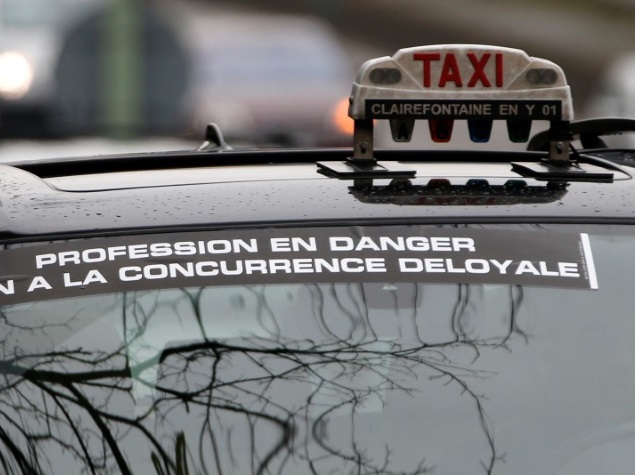Paris Cabbies Driven to Anger by Competition From Uber

Philippe Rossignol, 45, has been driving a taxi in Paris for 17 years and takes pride in the service he offers.
Sporting a suit and tie, and with magazines, water and a plug for charging your phone, he aims to offer a little more than the average cabbie.
But his business is in trouble with profits down some 15 to 20 percent and he lays the blame on mobile apps such as Uber, which have flooded the market with amateur drivers.
"There are more and more of us taking a share of the same pie," said Rossignol, who comes from a family of taxi drivers, grumbling he can no longer afford to knock off early when he's close to home.
Similar complaints have been heard from cabbies all over the continent, with drivers staging anti-Uber protests from Madrid to London to Berlin.
But Paris with its tradition of protectionism was always going to be the most combative.
Indeed, Uber's American founder Travis Kalanick says he got the idea for his company while struggling to hail a cab in Paris.
(Also see: Uber Steers Anti-Taxi Idea to Become Global Phenomenon)
In 2010, a poll by Hotels.com put Paris dead last among the world's tourist hotspots for the quality of its taxis, the main complaint being the rudeness of drivers.
The same year, a French think tank found that its rigid regulations meant Paris had only 2.6 taxi drivers per 1,000 people, compared with 8.6 in London and 17.2 in Dublin.
'Certain shortcomings'
The government tried to prise open the sector in 2009 by offering a new licence allowing drivers to do pre-booked journeys but not pick up customers in the street.
However the idea only really took off when Uber arrived two years later.
Uber's app puts customers together with independent drivers, and allows them to rate their chauffeur and see a map of the route giving drivers an incentive to be polite, courteous and honest.
Rides in its "UberPOP" service, which uses drivers without any kind of professional licence, cost around half an ordinary taxi ride.
The app has turned into a global phenomenon, valued last month at $40 billion (roughly Rs. 2,45,639 crores).
Rossignol concedes that Uber's success is partly a result of "certain shortcomings" with the City of Light's taxis.
He says call centres have put pressure on drivers to improve their appearance and attitude, but he still feels the competition from Uber is "neither right, fair nor healthy".
His chief complaint is that traditional taxi drivers face far stricter regulations including annual inspections of cars and medical visits and must cough up for an expensive licence which many Uber drivers do not require.
"Today, a young person will work hard, gain his licence, but he will no longer get a return on his investment," said Rossignol.
UberPOP is technically illegal in France, but the company has ignored the rules and appealed a 100,000-euro ($113,000) fine it received last year.
Uber's Kalanick told a technology conference in Munich this month that the laws only "exist because the taxi industry is trying to protect itself through regulatory capture."
He said Uber would create 50,000 new jobs in Europe this year, and help take 400,000 cars off the road by encouraging drivers to use taxis instead of their own vehicle.
That is unlikely to convince Paris cabbies. Alain Griset, head of the National Union of Taxis (UNT), says Uber only works because it forces down wages.
"If politicians had any courage, they would ban this business that takes advantage of people who use it to scrape together a few measly euros," he said.
For the latest tech news and reviews, follow Gadgets 360 on X, Facebook, WhatsApp, Threads and Google News. For the latest videos on gadgets and tech, subscribe to our YouTube channel. If you want to know everything about top influencers, follow our in-house Who'sThat360 on Instagram and YouTube.
Related Stories
- Samsung Galaxy Unpacked 2025
- ChatGPT
- Redmi Note 14 Pro+
- iPhone 16
- Apple Vision Pro
- Oneplus 12
- OnePlus Nord CE 3 Lite 5G
- iPhone 13
- Xiaomi 14 Pro
- Oppo Find N3
- Tecno Spark Go (2023)
- Realme V30
- Best Phones Under 25000
- Samsung Galaxy S24 Series
- Cryptocurrency
- iQoo 12
- Samsung Galaxy S24 Ultra
- Giottus
- Samsung Galaxy Z Flip 5
- Apple 'Scary Fast'
- Housefull 5
- GoPro Hero 12 Black Review
- Invincible Season 2
- JioGlass
- HD Ready TV
- Laptop Under 50000
- Smartwatch Under 10000
- Latest Mobile Phones
- Compare Phones
- Vivo Y200+
- Lava Yuva 2 5G
- OnePlus Ace 5
- OnePlus Ace 5 Pro
- Oppo A5 Pro 5G
- Vivo Y29 5G
- Honor Magic 7 RSR Porsche Design
- Moto G15 Power
- Asus Zenbook S 14
- MacBook Pro 16-inch (M4 Max, 2024)
- Honor Pad V9
- Tecno Megapad 11
- boAt Enigma Gem
- boAt Enigma Daze
- Sony 65 Inches Ultra HD (4K) LED Smart TV (KD-65X74L)
- TCL 55 Inches Ultra HD (4K) LED Smart TV (55C61B)
- Sony PlayStation 5 Pro
- Sony PlayStation 5 Slim Digital Edition
- Blue Star 1.5 Ton 3 Star Inverter Split AC (IC318DNUHC)
- Blue Star 1.5 Ton 3 Star Inverter Split AC (IA318VKU)

















